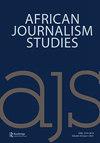数字政治素养?约翰内斯堡内城的三个社区组织如何在社交媒体上失误
IF 1.8
3区 文学
Q3 COMMUNICATION
引用次数: 0
摘要
社交媒体已被强调为社会正义组织进入网络、提高知名度从而增强自身力量的工具。然而,利用社交媒体平台来提高社会正义组织的知名度和影响力并不容易。本文章由计算机程序翻译,如有差异,请以英文原文为准。
Digital Political Literacy? How Three Community-Based Organisations in Inner-City Johannesburg Miss the Mark on Social Media
Social media has been highlighted as a tool for social justice organisations to access networks, increase their visibility and thereby increase their power. However, using social media platforms fo...
求助全文
通过发布文献求助,成功后即可免费获取论文全文。
去求助
来源期刊

African Journalism Studies
COMMUNICATION-
CiteScore
1.90
自引率
10.00%
发文量
18
期刊介绍:
Accredited by the South African Department of Higher Education and Training for university research purposes African Journalism Studies subscribes to the Code of Best Practice for Peer Reviewed Scholarly Journals of the Academy of Science of South Africa. African Journalism Studies ( AJS) aims to contribute to the ongoing extension of the theories, methodologies and empirical data to under-researched areas of knowledge production, through its emphasis on African journalism studies within a broader, comparative perspective of the Global South. AJS strives for theoretical diversity and methodological inclusivity, by developing theoretical approaches and making critical interventions in global scholarly debates. The journal''s comparative and interdisciplinary approach is informed by the related fields of cultural and media studies, communication studies, African studies, politics, and sociology. The field of journalism studies is understood broadly, as including the practices, norms, value systems, frameworks of representation, audiences, platforms, industries, theories and power relations that relate to the production, consumption and study of journalism. A wide definition of journalism is used, which extends beyond news and current affairs to include digital and social media, documentary film and narrative non-fiction.
 求助内容:
求助内容: 应助结果提醒方式:
应助结果提醒方式:


